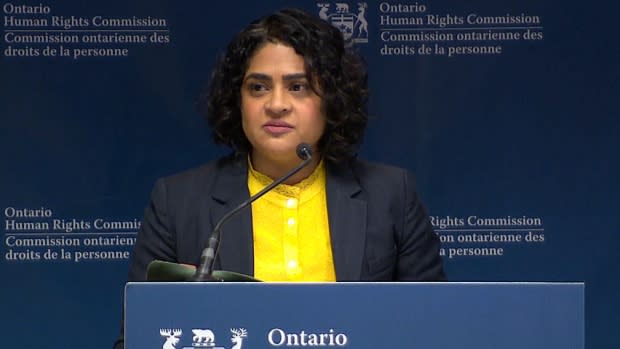Black people 'grossly overrepresented' in violent police interactions, Ontario human rights report says
A black person in Toronto is nearly 20 times more likely than a white person to be shot and killed by police, according to a new Ontario Human Rights Commission report on race and policing.
The commission's interim report said black people were overrepresented in several types of violent police interactions, including use-of-force cases, shootings, deadly encounters and fatal shootings.
"[The report] confirms the long-standing concern of black communities that they are overrepresented in incidents of serious injury or deadly force involving the TPS," according to the report released Monday.
"Our interim findings are disturbing and call for immediate action," added Renu Mandhane, the OHRC's chief commissioner.
The report, titled "A Collective Impact," analyzed two periods of data from the Special Investigations Unit (SIU) between 2000 and 2006, and 2013 and 2017. The analysis was conducted by Prof. Scott Wortley, a criminologist at the University of Toronto.
The SIU is Ontario's police watchdog, which investigates police interactions involving serious injury, death, or allegations of sexual assault.
Severity of incidents a concern
Despite the fact black people make up 8.8 per cent of Toronto's population, the OHRC found they were "grossly overrepresented" in SIU investigations.
The report also concluded that black people were more likely to be involved as the severity of the incident increases.
Out of the 244 cases analyzed from 2013 to 2017, black people made up:
25.4 per cent of SIU investigations.
28.2 per cent of police use-of-force cases.
36 per cent of police shootings.
61.5 per cent of police use-of-force cases resulting in civilian death.
70 per cent of police shootings resulting in civilian death.
The OHRC report also found that more white people were carrying weapons in police use of force cases, and that white people allegedly threatened or attacked police more often than black people. In police shootings, 20 per cent of white people were carrying a gun versus 11.1 per cent of black civilians.
Members of Toronto's black community say the findings validate what they have known for decades.
"These are not, in fact, new times," said Sam Tecle, who works for a youth program in Toronto's Jane and Finch neighbourhood.

He said young black people repeatedly tell him that they deliberately try to avoid police for fear of being targeted.
"Do I feel like talking to police today? Do I want to be harassed, hassled, questioned?" Tecle said of their concerns. "These stories are every day, they are common."
The final version of the report is expected to include extensive internal data obtained from Toronto police, including lower level use-of-force incidents and instances of carding. The OHRC expects to release those findings in 2020.
"Clearly, we've established that these gross disparities and disproportionalities exist. The next step in the analysis is going to try to explore the various explanations for these racial disparities," Wortley said. "I don't think we can ignore these differences and sweep them under the table."
Police accept recommendations, raise concerns about report
In a joint response to the report, Toronto police and the Toronto Police Services Board said no organization is "immune from overt and implicit bias," and that the force is actively working to address those issues.
However, the service also indirectly raised concerns about the legitimacy of the findings.
"Some may raise questions about the approach, methodology and statistical basis of this report, and it is important that all of these issues be scrutinized to ensure the fullest and fairest analysis and accounting," the statement said.
Police did not elaborate on what exactly those questions might be. The statement went on to say that police will commit to "doing even better" when it comes to reducing bias.
"We have been working for several years to confront these challenges in a variety of ways and with a variety of partners. Indeed, our continued work will be shaped and informed by a wide number of steps already undertaken and underway," the report said.

OHRC wants race-based data
The OHRC is calling on Toronto police to acknowledge the racial disparities and community experiences outlined in its report. The commission also wants the Toronto Police Services Board to require officers to begin collecting and publicly reporting on race-based data.
Toronto police said they would be accepting the recommendations, but added the collection of race-based data required further examination by its anti-racism advisory panel.
"This work will consider the legitimate concerns surrounding the impact of race-based data collection on interactions between police and members of Toronto's communities, and look to collect this data in a manner that will strengthen our connection to the communities we serve," the statement read.

